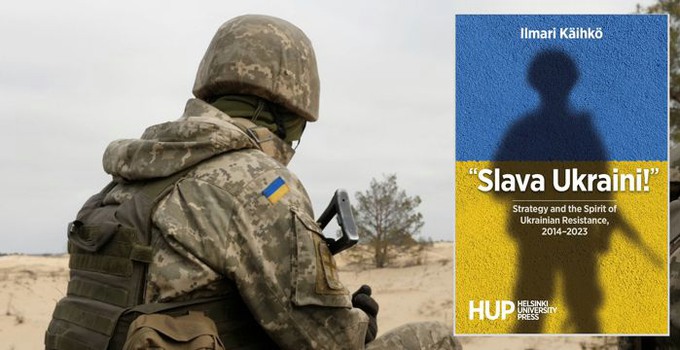
Volunteers' role in Ukraine
In the book "Slava Ukraini", Ilmari Käihkö examines the role of volunteer soldiers in Ukraine during the conflict in Donbas in 2014 and in the ongoing war against Russia.
The book describes, among other things, how the will to defend, cohesion in military units, and resistance strategies develop in Ukraine during the period 2014–2023.
Non-state actors took the lead
Ilmari Käihkö, Associate Professor and Senior Lecturer in War Studies at the Swedish Defence University, began working on the book in 2016, shortly after defending his dissertation on rebel and militia groups in Liberia.
"At the beginning of the Donbas war, it was not armies but volunteers who took the lead, which I found interesting. I could therefore continue my research on non-state armed groups, which I had previously studied in Liberia, in a European context. I was also surprised that interest in an ongoing war in Europe was almost nonexistent then, which changed only after Russia's large-scale invasion on February 24, 2022."
Strategic and sociological research
In his work on the book, he draws on both strategic and sociological research on war and nationalism.
"The volunteer battalions I examine clearly show that it is too narrow to focus only on the use of military power to understand war and warfare. Forces must first be created and then controlled before they can be used for any strategic purpose," he explains.
The war in Donbas shows that the whole process is permeated by politics in a way that we may not be accustomed to, he argues:
"We often perceive the military, society, and the state as parts of one and the same package. This assumption is not always accurate, as in Ukraine after the Maidan revolution in 2014, which divided society and weakened the state. In such situations, space is created for non-state actors, in Ukraine's case, both volunteer militias and Russian-supported separatists."
The war's impact on Ukrainian society
He also discusses how the wars in Ukraine are perceived and how they affect Ukrainian society, where the war in Donbas was a delimited war with limited sociological effects.
"It will be interesting to see if the ongoing large-scale invation has more extensive effects on the Ukrainian state and society—or if it, too, will be forgotten in the long run by both Ukrainian and Swedish society."
Ethnographic research onsite and online
The research the book is based on has been conducted both onsite and online.
"The first challenge was to find Ukrainian volunteer combatants who wanted to share their experiences. Unlike the militiamen in Liberia, the Ukrainian volunteers perceived their cause as legitimate, making it easier to find informants."
He could also use social media to stay in touch, facilitating the work.
"This 'chatnography' became an important component, although I soon realized that there were limits to what my informants felt comfortable sharing online."
He visited Ukraine eleven times before the pandemic, when social media became important again for the continued data collection.
"After Russia's large-scale invasion, contacts have become less frequent, but they are still regular.
Strategy, the sociology of war and ethnographic methods
Ilmari Käihkö hopes that the book will contribute to ongoing discussions about strategy, the sociology of war, and ethnographic methods and that it can provide a longer and more human perspective on the war.
"This is a war that many have followed for almost two years, but it actually began almost a decade ago. My hope is that the book also can contribute to the development of academic debates in Ukraine, which has suffered due to Russia's war of aggression."
Publication
'Slava Ukraini!': Strategy and the Spirit of Ukrainian Resistance 2014–2023 is published by Helsinki University Press and can be downloaded with open access.
More about
War StudiesPage information
- Published:
- 2023-12-22
- Last updated:
- 2024-01-18
